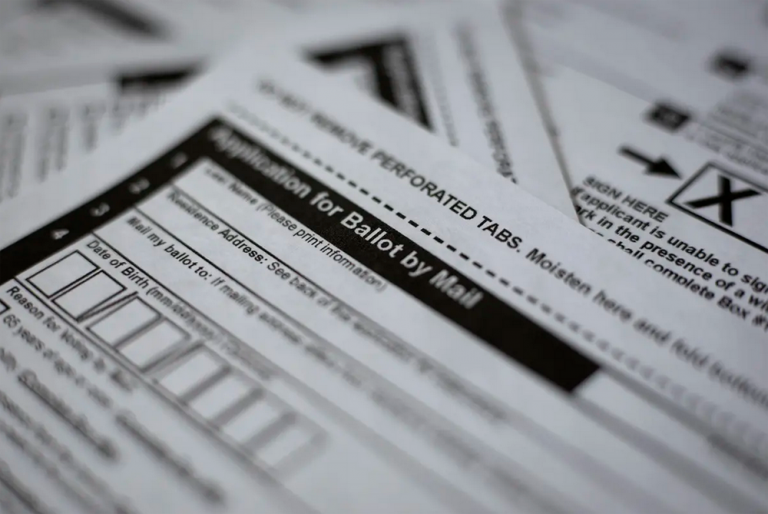by Alexa Ura
The Texas Supreme Court on Friday temporarily put on hold an expansion of voting by mail during the coronavirus pandemic.
Siding with Attorney General Ken Paxton, the Supreme Court blocked a state appeals court decision that allowed voters who lack immunity to the virus to qualify for absentee ballots by citing a disability. That appellate decision upheld a lower court’s order that would have allowed more people to qualify to vote by mail. The state’s Supreme Court has not weighed the merits of the case.
It’s the latest in an ongoing legal squabble that in the last three days has resulted in daily changes to who can qualify for a ballot they can fill out at home and mail in.
Federal and state courts are considering legal challenges to the state’s rules for voting by mail as Democrats and voting rights groups ask courts to clarify whether lack of immunity to the coronavirus is a valid reason for people to request absentee ballots. A resolution to that question is gaining more urgency every day as the state approaches the July primary runoff elections.
Paxton asked the Supreme Court to intervene the day after a state appeals court let stand a ruling from state District Judge Tim Sulak that susceptibility to the coronavirus counts as a disability under the state election code and is therefore a legally valid reason for voters to request absentee ballots.
The appeals court rebuffed Paxton’s efforts to block voters from requesting absentee ballots under those conditions while the case was making its way through the courts.
But the Supreme Court’s Friday decision means that order will remain blocked while the appeal of the case moves forward.
“The Legislature has carefully limited who may and may not vote by mail,” Paxton said in a statement after the ruling. “The Travis County trial court’s decision to allow everyone to vote by mail is contrary to state law and will be reversed on appeal.”
In a statement, Texas Democratic Party Chair Gilberto Hinojosa said the party would continue the legal battle.
“This is a dark day for our democracy,” he said. “The Republican Texas Supreme Court is wrong to force the people of Texas to choose between their health and their right to vote. They would have Texans die, just so they can hold on to power.”
The attorney general has said local officials must follow his reading of existing eligibility requirements. Paxton argues that a fear of contracting the virus while voting in person doesn’t meet the state’s definition of a disability.
The Texas election code defines disability as a “sickness or physical condition” that prevents a voter from appearing in person without the risk of “injuring the voter’s health.”
But Sulak’s ruling is not based on voters’ fear of contracting the virus; instead, he agreed with the individual Texas voters, state Democrats, and civic organizations that argued that a lack of immunity to the virus makes voters eligible under the existing disability definition.
The court also set oral arguments for Wednesday on Paxton’s request for it to weigh in on whether the appeals court erred and abused its discretion when it allowed Sulak’s order to go into effect.
This story originally published by the Texas Tribune.


View Comments
"A shocking new report in The New York Times on Monday revealed that the Republican party plans to employ 50,000 people at the polls—some of whom will be armed—to intimidate Democratic voters across critical swing states, and that the Republicans intend to spend at least $20 million on nefarious lawsuits designed to suppress the vote this fall.1
This is a stark and disturbing escalation in the Republican party's voter suppression tactics, resulting from a 2018 court ruling overturning decades of precedent that stopped the GOP from blatant voter suppression and intimidation efforts.2 Since 1982, the GOP was barred from pursuing what they called "ballot security" measures, after a lawsuit showed that they had engaged in a coordinated campaign to remove voters of color from voter rolls through a deceptive mail campaign and even hired off-duty police officers to patrol majority-minority polling locations to intimidate voters.3" -MoveOn.org
1. "Freed by Court Ruling, Republicans Step Up Effort to Patrol Voting," The New York Times, May 18, 2020
2. Ibid.
3. "The Republican Party Emerges From Decades of Court Supervision," The Atlantic, January 9, 2018